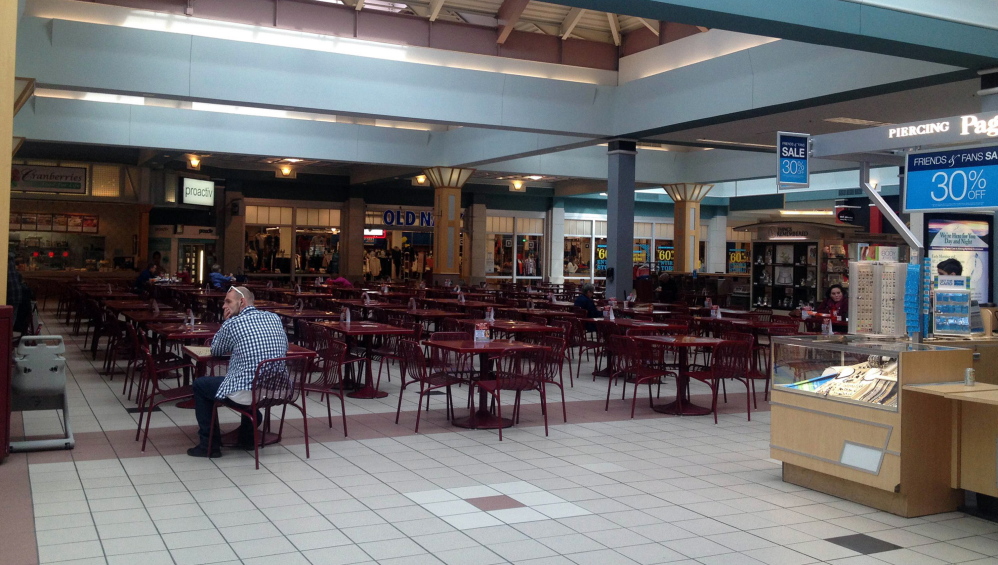CONCORD, N.H. — On a crisp Friday evening in late October, Shannon Rich, 33, is standing in a dying American mall. Three customers wander the aisles in a Sears the size of two football fields. The RadioShack is empty. A woman selling smartphone cases watches “Homeland” on a laptop.
“It’s the quietest mall I’ve ever been to,” says Rich, who works for an education consulting firm and has been coming to the Steeplegate Mall in Concord, New Hampshire, since she was a kid. “It bums me out.”
Built 24 years ago by a former subsidiary of Sears Holdings Corp., Steeplegate is one of about 300 U.S. malls facing a choice between reinvention and oblivion. Most are midsized-market shopping centers being squeezed between big-box chains catering to low-income Americans and luxury malls lavishing white-glove service on One Percenters.
It’s a time of reckoning for an industry that once expanded pell-mell across the landscape armed with the certainty that if you build it, they will come. Those days are over. Malls like Steeplegate either rethink themselves or disappear.
This summer, Rouse Properties Inc., a real estate investment trust with a long track record of turning around troubled properties, decided Steeplegate wasn’t salvageable and walked away. The mall is now in receivership.
As management buys time by renting space to temporary shops selling Christmas stuff, employees fret that if the holiday shopping season goes badly, more stores will close. Should the mall lose one of its anchors – Sears, J.C. Penney Co. or Bon-Ton Stores Inc. – the odds of survival lengthen.
“Rouse is basically saying, ‘We surrender,’ ” said Rich Moore, an analyst at RBC Capital Markets who has covered mall operators for more than 15 years. “If Rouse couldn’t make it work and that’s their specialty, then that’s a pretty tough sale to keep it as is.”
Rouse, based in New York, declined to comment beyond an emailed statement saying it had determined that Steeplegate “would not meet our long-term return-on-investment criteria.”
BATTERED BY THE COMPETITION
The suburban mall once sat at the center of American life. It was a place where parents one-stop-shopped and their kids hung out. The Galleria in Sherman Oaks, California, featured prominently in the seminal film “Fast Times at Ridgemont High” as well as Frank Zappa’s “Valley Girl.” Today the mall represents a darker mood. Consider the shuttered shopping center colonized by the dispossessed in “Gone Girl.”
Steeplegate, or “Sleepygate” as many locals call it, confronts a familiar litany of woes: online competition, the increasing irrelevance of mass-market chains, fancier malls and factory outlets just up the highway.
The mall is also losing shoppers to Concord’s resurgent downtown, which like much of the United States is benefiting from a surge of people moving back from the suburbs and patronizing shops they can stroll to. Main Street has become a premium shopping district catering to consumers looking for local, unique merchandise. One store specializes in Birkenstock sandals. A farm-to-table Asian bistro called Sunny’s Table offers herb roast lobster and Korean fried chicken legs.
Some of the proprietors on Main were once Steeplegate tenants, including Mike Cohen, 60, who runs Pitchfork Records. Cohen hedged his bets in 1990 when the mall arrived: He kept his downtown store but also opened one at Steeplegate in case the new shopping center sucked away all his customers. By the time he closed the mall location five years later, things were so slow that Cohen amused himself by rolling a quarter across the mall to see if it hit anyone. It rarely did.
“That’s how dead it was, even back then,” said Cohen, whose remaining store is a no-frills ode to rock ‘n’ roll with rows of vinyl and album covers on the walls. “You want to know what was really wrong with it?” he asked. “No pizazz to the mall. None!”
A GLIMMER OF HOPE AMID GLOOM
In early October, a small sign of hope emerged when New Hampshire pizza restaurant Pizzico opened next to Perfect Pretzels. Pietlicki said foot traffic in the area doubled.
“We are thrilled, thrilled,” said Marjorie Buessing, owner of True Confections Candies & Gifts across from the food court. “We are grateful for the pizza shop.”
Pizzico’s arrival did little to raise the spirits of Tony Shefer. The custom T-shirt shop he opened before last Christmas is struggling. It’s around the corner from the pretzel place next to the Sears entrance.
Shefer, 46, sat on a bench outside his empty store lamenting his decision to leave Miami, where he has another location, to come 1,500 miles north to help with what he thought would be the busy season.
“I’ve been in a lot of malls in my life and this is the worst ever,” said Shefer, a native of Israel who sports long blond hair, a tan and a hoop in his left ear. “The economy in America isn’t so good. I know this, but not like this. There is something bad with this mall.”
Copy the Story LinkSend questions/comments to the editors.



Success. Please wait for the page to reload. If the page does not reload within 5 seconds, please refresh the page.
Enter your email and password to access comments.
Hi, to comment on stories you must . This profile is in addition to your subscription and website login.
Already have a commenting profile? .
Invalid username/password.
Please check your email to confirm and complete your registration.
Only subscribers are eligible to post comments. Please subscribe or login first for digital access. Here’s why.
Use the form below to reset your password. When you've submitted your account email, we will send an email with a reset code.